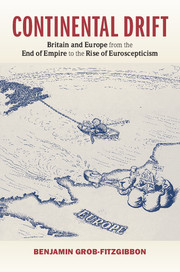Continental Drift Britain and Europe from the End of Empire to the Rise of Euroscepticism
Langue : Anglais
Auteur : Grob-Fitzgibbon Benjamin

A fascinating new account of Britain's uneasy relationship with the European continent from the Second World War to the present.
In the aftermath of the Second World War, Churchill sought to lead Europe into an integrated union, but just over seventy years later, Britain is poised to vote on leaving the EU. Benjamin Grob-Fitzgibbon here recounts the fascinating history of Britain's uneasy relationship with the European continent since the end of the war. He shows how British views of the United Kingdom's place within Europe cannot be understood outside of the context of decolonization, the Cold War, and the Anglo-American relationship. At the end of the Second World War, Britons viewed themselves both as the leaders of a great empire and as the natural centre of Europe. With the decline of the British Empire and the formation of the European Economic Community, however, Britons developed a Euroscepticism that was inseparable from a post-imperial nostalgia. Britain had evolved from an island of imperial Europeans to one of post-imperial Eurosceptics.
Acknowledgements; Introduction; Part I. Imperial Europeans: 1. A world undone; 2. Mr Churchill's Europe; 3. Mr Bevin's response; 4. The German problem; 5. A disunited Europe; 6. The continental surprise and the fall of the Labour government; 7. The realities of government; 8. Perfidious Gaul; 9. The decline and fall of the imperial Europeans; Part II. Post-Imperial Eurosceptics: 10. At sixes and sevens; 11. Towards the Common Market; 12. The rise of the anti-marketeers; 13. Empire eclipsed, Europe embraced, Britain rejected; 14. Entering the promised land? Britain joins 'Europe'; 15. Seasons of discontent; 16. Half-hearted Europeans; 17. Mrs Thatcher, John Major and the road to European Union; Conclusion: post-imperial Britain and the rise of Euroscepticism; Bibliographical note; Bibliography.
Benjamin Grob-Fitzgibbon currently works as a Foreign Service Officer (Diplomat) for the United States Department of State. Prior to joining the Foreign Service, he held the Cleveland C. Burton Professorship at the University of Arkansas, where he was also director of the Program in International Relations. He has held a Visiting Fellowship at Wolfson College, Cambridge, and has also taught at Duke University and North Carolina State University. His previously published works include The Irish Experience during the Second World War: An Oral History (2004), Turning Points of the Irish Revolution: The British Government, Intelligence, and the Cost of Indifference, 1912–1921 (2007) and Imperial Endgame: Britain's Dirty Wars and the End of Empire (2011).
Date de parution : 05-2016
Ouvrage de 601 p.
16x23.5 cm
Thème de Continental Drift :
© 2024 LAVOISIER S.A.S.



